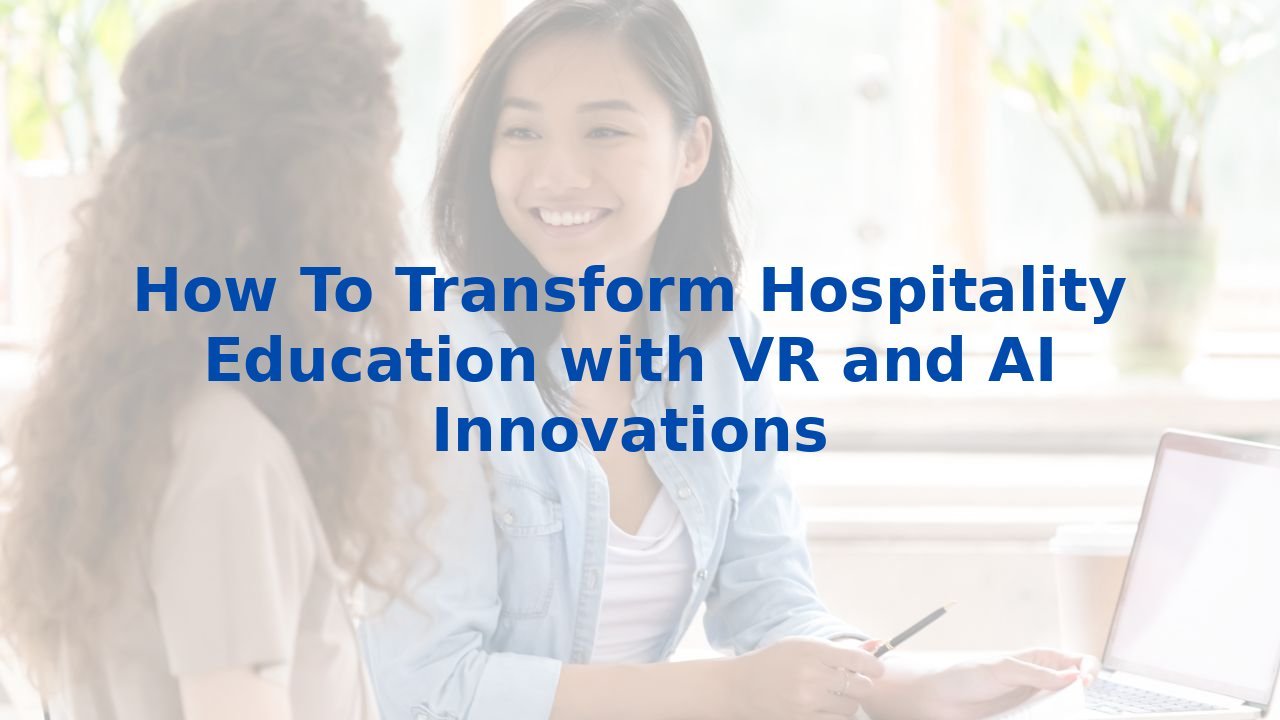How To Transform Hospitality Education with VR and AI Innovations
Exploring the Intersection of VR, AI, and Hospitality Education
As we step into a future richly infused with technology, the convergence of virtual reality (VR) and artificial intelligence (AI) stands out as a transformative force, especially in the field of education and within the intricacies of business processes. At the University of Central Florida's Rosen College of Hospitality Management, there is palpable excitement surrounding the exploration of VR technologies. These innovations not only promise to enhance learning experiences but also offer significant potential to streamline business operations across various sectors.
The Promise of VR in Education
Virtual reality has opened up a world of possibilities for educators and students alike. With immersive learning environments, students can engage with content in ways that traditional classroom settings simply cannot offer. Imagine hospitality students stepping into simulated hotel environments where they can practice customer service skills, manage crises, or even design event spaces—all from their classroom.
This innovative approach to learning through VR allows for a hands-on experience without the real-world consequences, paving the way for creativity and exploration. It allows students to fail forward, learning from their mistakes in a safe space. This is where AI can further enhance the benefits of VR—by personalizing the learning experience for each student based on their individual needs and performance metrics, ultimately improving outcomes.
How AI Enhances Business Processes
Integrating AI into business processes offers a myriad of advantages, especially in terms of efficiency and productivity. In the hospitality industry, for instance, AI can automate repetitive tasks such as booking management, customer inquiries, and routine reports. This ensures that employees can dedicate more time to high-value activities where human insight and creativity are paramount.
Moreover, AI-driven analytics tools can sift through vast amounts of data, delivering actionable insights that inform strategic business decisions. For example, analyzing guest feedback can identify trends and areas for improvement, allowing businesses to adapt swiftly to changing customer expectations. As we delve deeper into the operational side, the automation of supply chain management through AI can further refine processes, leading to cost reductions and improved service delivery.
Benefits of Employee Training for AI Integration
While embracing technology like AI and VR is essential, so is the foundation upon which these tools are built—our workforce. Training employees to effectively leverage AI not only equips teams with the necessary skills to use these technologies but also fosters a culture of innovation within an organization.
Employees who feel confident in their ability to harness AI will ultimately drive business success. By investing in comprehensive training solutions that cater to varying levels of experience and departments, organizations ensure that all employees can benefit from technological advancements. This training can empower teams not only to adopt new tools but also to think creatively about how these technologies can enhance their specific roles and responsibilities.
Additionally, a workforce well-versed in AI can lead to an accelerated adoption of innovative practices, fostering collaboration across departments. When employees recognize the value that AI can bring to their daily tasks, it ignites a sense of ownership and engagement that enhances overall productivity.
The Role of Innovation in Today’s Business Landscape
In an era where change is the only constant, embracing innovation is critical for staying ahead. Organizations that fail to recognize the value of investing in emerging technologies like AI and VR risk being left behind. By applying these technologies to educational frameworks and business processes, businesses can cultivate a learning environment that champions growth and forward-thinking strategies.
“Innovation distinguishes between a leader and a follower.” – Steve Jobs
Conclusion: The Future of Hospitality Management Education
As we continue to explore the potent combinations of VR and AI in the realm of education, the University of Central Florida's Rosen College of Hospitality Management stands poised to lead the charge. Investing in these technologies provides not just a competitive edge in education but also cultivates a workforce empowered to drive business success.
As we move forward, organizations are called to reflect on their current practices and envision how they can utilize emerging technologies. Training employees to proficiently navigate these innovations creates a ripple effect—one that enhances efficiency, promotes creativity, and prepares teams for the challenges of tomorrow.
In a world where technology continues to shape our experiences, the journey into the realms of AI and VR seems not just beneficial, but essential. So, let’s engage, innovate, and most importantly, imagine a future where education meets technology in the most inspiring ways.



